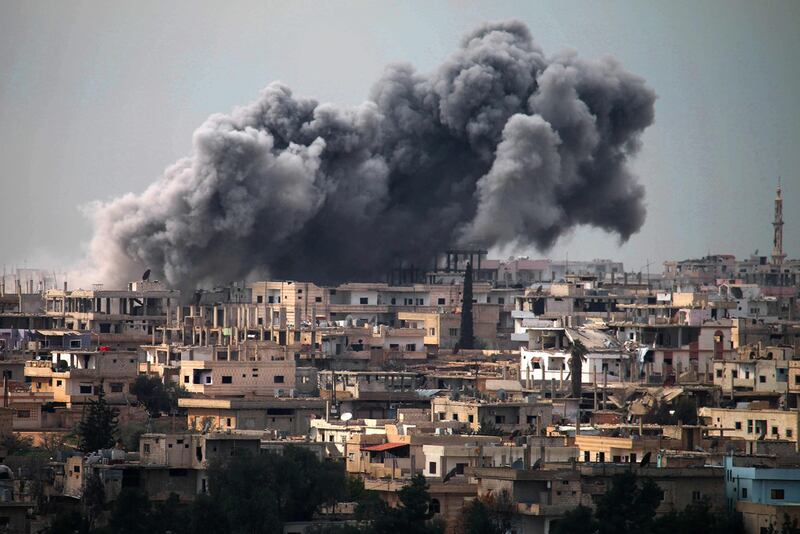Ashton Carter, former United States secretary of defence, made clear last October that operations to force ISIL militants from their main urban strongholds, the Iraqi city of Mosul and the Syrian city of Raqqa, would intentionally overlap.
The continuing Iraqi army operation in Mosul started on October 17. The Kurdish-led Syrian Democratic Forces launched their offensive to encircle Raqqa on November 6. Concurrent operations are logical since they deny ISIL the opportunity to relocate fighters from one of their strongholds to another.
However, there is still a risk this might happen in a third significant city, which has not received as much attention. Approximately 140 kilometre south-east of Raqqa sits the provincial capital city of Deir Ezzor.
For more than two years ISIL has besieged an isolated garrison of Syrian army soldiers defending the airport there. As a result of this siege more than 100,000 civilians in Deir Ezzor have had to endure a humanitarian crisis. This prompted the World Food Programme to air-drop aid to them to hinder ISIL’s efforts to starve them into submission. The Syrian garrison in Deir Ezzor also relies on Russian and Syrian airdrops to hold the line against ISIL. If the militants do manage to capture this city in the near future then losing both Mosul and Raqqa might be a less overall crushing defeat since they would have another urban stronghold from which to operate.
Deir Ezzor is an “artery to western Iraq”, according to Faysal Itani, a resident senior fellow at the Atlantic Council’s Hariri Center for the Middle East who follows the Syrian conflict very closely. “Basically the city and its populated surroundings offer ISIL both strategic depth and a supply line running into Iraq.”
ISIL control over the Deir Ezzor region could threaten Iraq’s large sparsely populated western province of Anbar. The group attained its initial foothold in Iraq by seizing Fallujah in January 2014 and holding it until a large Iraqi force removed them year. They could once again try to destabilise Anbar.
Baghdad has recognised the threat ISIL control over Deir Ezzor poses to them. Iraqi prime minister Haider Al Abadi said his country carried out air strikes with authorisation from Damascus.
The SDF cut off the Raqqa-Deir Ezzor motorway from ISIL earlier this month. By doing so they have severed what was arguably the militants most important remaining supply route, denying them the ability to move reinforcements from Deir Ezzor to Raqqa, and vice versa. The SDF heralded its capture saying they now have Raqqa completely isolated. Last month the Pentagon said non-combat members of ISIL were “moving their operations further down river”, an acknowledgement that their days in Raqqa are numbered.
“Interestingly the US did not give Deir Ezzor much attention,” Mr Itani noted. “Until recently the entire Euphrates river valley was not really in the scope of the anti-ISIL campaign. For whatever reason that appears to be changing according to reports from the department of defence.”
The anti-ISIL coalition does not work with Syrian forces under the command of Bashar Al Assad. Last September US-led coalition air strikes killed scores of Syrian soldiers in the city. Washington expressed regret for the incident, saying they mistakenly identified the soldiers as ISIL militants.
Earlier this month a Russian-backed Syrian regime offensive successfully recaptured Palmyra in Homs province from ISIL. It’s unclear if the regime aims to reclaim a foothold in Raqqa and Deir Ezzor provinces in light of the increased pressure on ISIL.
If so it certainly wouldn’t be unprecedented. Last year, as the SDF were preparing for their summer offensive against ISIL in Manbij, they advanced into parts of Raqqa’s northern countryside.
In June, Syrian regime forces promptly rushed to regain a foothold in that province. ISIL responded by sending in reinforcements to repel that offensive as it reached the city of Al Tabqa on the Euphrates. The militants successfully managed to destroy this offensive, denying the regime any foothold in the province. These forces only received limited Russian air support in the campaign, which may well have contributed to their devastating defeat.
Today Moscow is likely to offer substantial support to a Syrian offensive aimed at reinforcing the Syrian garrison in Deir Ezzor.
This would also ensure that the SDF are unable to take control over the city after ISIL’s defeat. In December the SDF established a military council for Deir Ezzor – the same kind they established and implemented in Manbij last summer – to secure that key city if they are the ones who do eventually capture it.
“The city’s importantance to Assad is broader of course, and not limited to or even primarily about ISIL,” Mr Itani explained. “The city is the capital of the province that contains most of Syria’s hydrocarbon reserves and a large amount of its agriculture. This is one reason the regime has fought so hard to retain a foothold, however small, outside the city.”
Restored regime control over Deir Ezzor city and the surrounding province would give the regime a greater foothold in Syria’s east, something it hasn’t had for several years now.
Paul Iddon is a freelance journalist in Erbil, Iraqi Kurdistan, who writes about Middle East politics, affairs and history
On Twitter: @pauliddon





